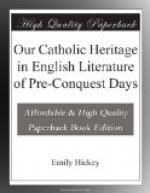But it could not be hidden from God how pride had taken hold of His angel. And Satan resolves in that pride not to serve God. Bright and beautiful in his form, he will not obey the Almighty. He thinks within himself that he has more might and strength than the Holy God could find among his fellows. “Why should I toil, seeing there is no need that I should have a lord? With my hands I can work marvels as many as He. Great power have I to make ready a goodlier throne, a higher one in Heaven. Why must I serve Him in liegedom, bow to Him in service? I am able to be God even as He. Strong comrades stand by me, who will not fail me in the strife; stout-hearted heroes.”
And so does Satan resolve to be the foe of God.
Surely we must be reminded of Milton’s great poem when we read how Satan, ruined and cast into hell, speaks to his comrades, lost with him. He compares the “narrow place” with the seat he had once known in Heaven, and denies the right doing of the Almighty in casting him down. He says too that the chief of his sorrows is that Adam, made out of earth, shall possess the strong throne that once was his; Adam, made after God’s likeness, from whom Heaven will be peopled with pure souls. And he plans revenge on God by striving to destroy Adam and his offspring.
All this, and the appeal to one of his followers to go upward where Adam and Eve are, and bring about that they should forsake God’s teaching and break His Commandments, so that weal might depart from them and punishment await them, may be compared with “Paradise Lost,” Books I, II.
It is needless to say that the English were a war-like race. They loved the clash of swords, the whizzing of the arrow in its flight, the fierce combat, the struggle to keep the battle-stead, as they phrased the gaining of a victory. We shall see more of this by and by. And this spirit comes out in their poetry written after they had received Christianity. They delight in the story of struggle, of brave combat, of victory. They saw in the hosts of Pharaoh the old Teuton warriors, with the bright-shining bucklers, and the voice of the trumpets and the waving of banners. Over the doomed host the poet of “Exodus” saw the vultures soaring in circles, hungry for the fight, when the doomed warriors should be their prey, and heard the wolves howling their direful evensong, deeming their food nigh them. Here is the description of the Destruction of the Egyptians. The translation is by Henry S. Canby:—
Then with blood-clots was
the blue sky blotted;
Then the resounding ocean,
that road of seamen,
Threatened bloody horror,
till by Moses’ hand
The great Lord of Fate freed
the mad waters.
Wide the sea drove, swept
with its death-grip,
Foamed all the deluge, the
doomed ones yielded,
Seas fell on that track, all
the sky was troubled,
Fell those steadfast ramparts,
down crashed the floods.




